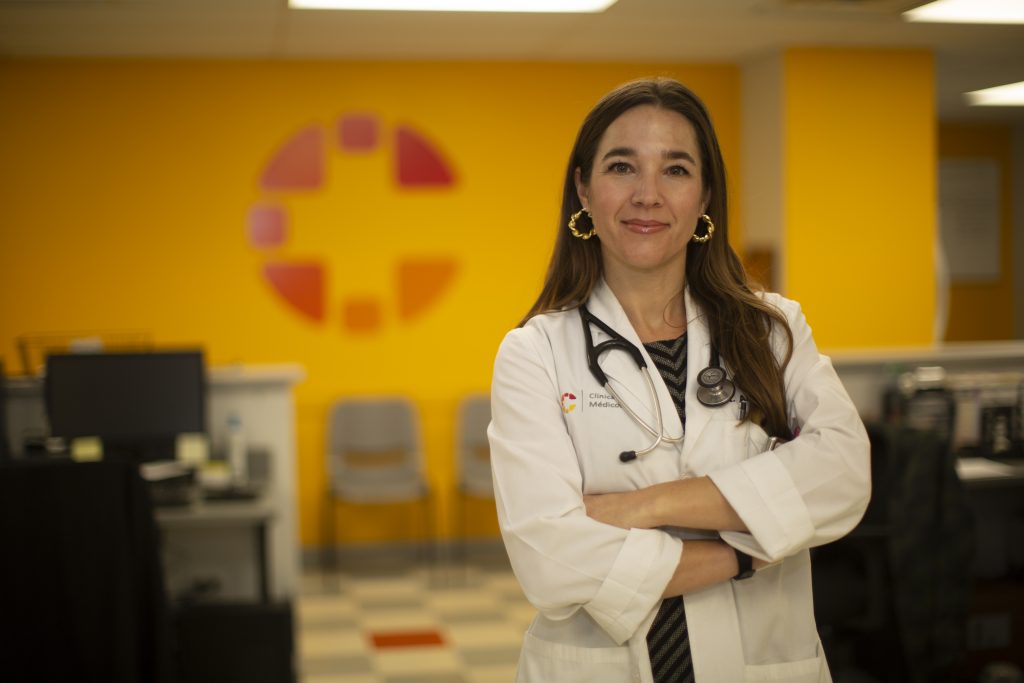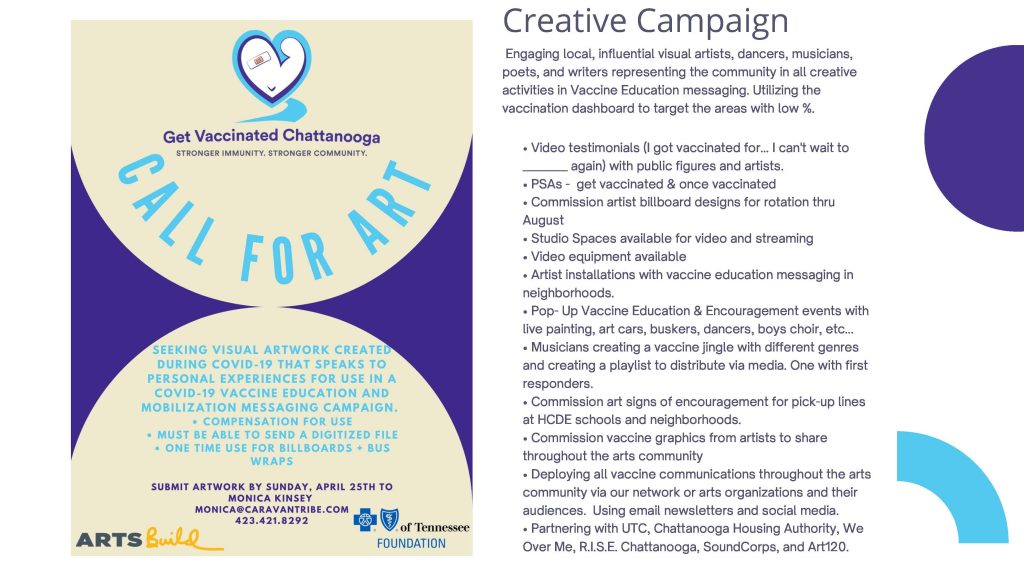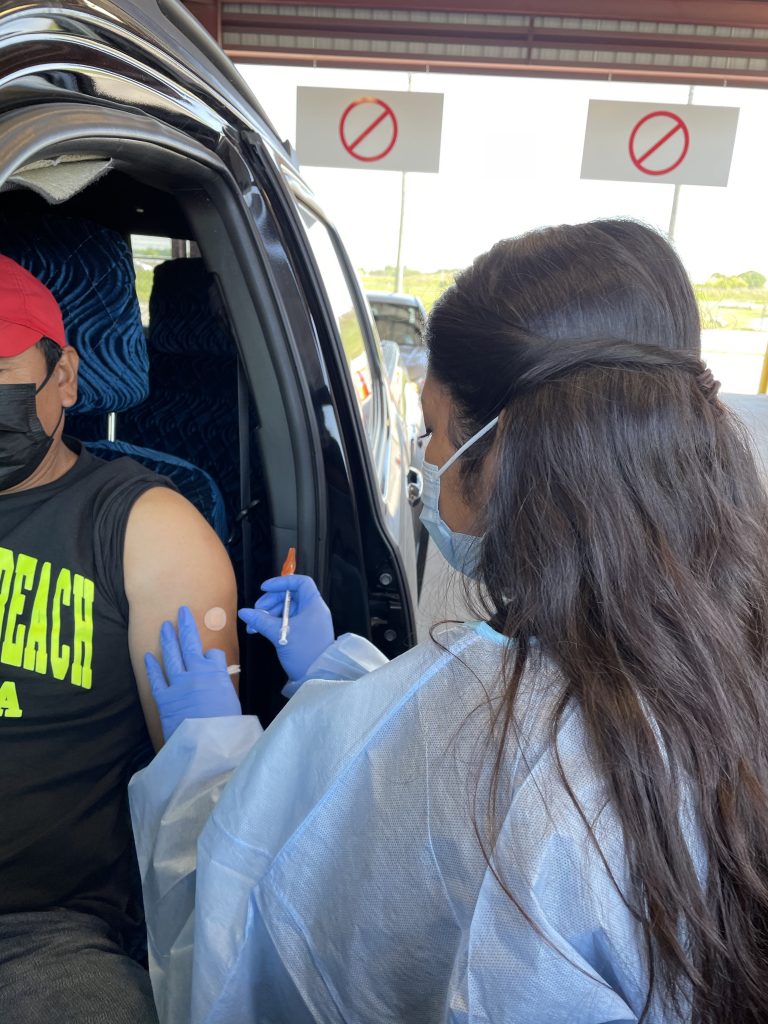BCBST Staff, BCBST News Center, June 2, 2021
KEY TAKEAWAYS
- In the U.S., the Centers for Disease Control and Prevention estimates that less than 15% of the Hispanic community and less than 10% of the Black community have received at least one vaccination
- The BlueCross BlueShield of Tennessee Foundation awarded $610,560 in grants toward COVID-19 vaccination efforts in Chattanooga
- The Community Foundation of Greater Chattanooga received $401,664 to fund a communications campaign and vaccine support program for vulnerable populations including African-Americans, Latinx residents, older adults and people with disabilities
- Clinica Medicos, the first community site in Chattanooga to receive and distribute COVID-19 vaccines, was given $208,896 to expand services for underserved populations
- The Chattanooga grants were part of $1.7 million awarded statewide to help communities promote and support COVID-19 vaccinations
“What’s going to happen to me?”
That question has been asked often during the COVID-19 pandemic, especially by Tennesseans in underserved communities. Initially, African American, LatinX and other vulnerable populations lacked access to testing. Once that need was addressed, they lacked access to the vaccine, or to information that would allow them to feel comfortable getting the vaccine once they could.
Delivering the message that the vaccine is safe — from both a health and cultural perspective — takes time, says Clinica Medicos medical director Dr. Kelly Arnold.
“Our clinic is primarily Spanish-speaking — a mix of low-income, uninsured and undocumented families,” she says. “As the first community site in Chattanooga to receive vaccines from the state, we had to start by determining how we could best advocate for our patients and address their questions: ‘Do I qualify if I’m uninsured or undocumented? How much does it cost? What are the effects if I get vaccinated?’ There are so many societal barriers that prevent people from getting the vaccine, and we have to start by dismantling those.”

For vulnerable populations, it often takes repeated messaging for someone to feel comfortable to get vaccinated, especially with a new vaccine. More than that, it takes established relationships.
“In order to believe what someone is saying, you have to trust them,” Kelly says. “You need someone you’ve seen in your community every day, who you feel greets you kindly, and who you know has your best interest at heart to bring it over the finish line. In that way, the messenger will always trump the message.”
Coming from the same place
That’s something Chattanooga’s community leaders agreed upon early in the pandemic. When it comes to the COVID-19 vaccine, every population needs information delivered in ways they can hear and act on. That means the messages and education have to be crafted and delivered by people with the same lived experiences as theirs.
“In black and brown communities, we’ve been the ones that medicine has been experimenting on down through the years,” says Rev. Ternae Jordan Sr. of Mount Canaan Baptist Church. “Because there’s this distrust, when something like this new vaccine comes out, you have to start by educating people. And it’s important that the people who deliver the message look like the people they’re delivering it to.
“It’s also important to have organizations like BlueCross meeting the people where they are. It’s not enough to say, ‘Here it is, come and get it.’ The most vulnerable people can’t get to it. This grant is helping us go to them as opposed to asking them to come to us.”
Getting the message to the most vulnerable
Ternae is talking about the $401,664 grant from the BlueCross BlueShield of Tennessee Foundation that is currently funding the coalition-led Get Vaccinated Chattanooga communications campaign and vaccine support program spearheaded by the Community Foundation of Greater Chattanooga (CFGC).
The program is focused on vulnerable populations in the Chattanooga area, including:
- African-Americans
- Latinx residents
- Older adults
- People with disabilities
- People experiencing homelessness
- The reentry population (those who have recently been in the criminal justice system)
- Pediatrics (grades K-12)
As part of its communications and messaging strategy, Get Vaccinated Chattanooga has also partnered with ArtsBuild. The local arts organization is providing vaccine messaging design and is coordinating the creation of videos, billboards and other media targeted to these vulnerable populations.
“With this grant, we can strategically, intentionally go deeper with vulnerable populations through the Get Vaccinated Chattanooga program,” says Dwayne Marshall, VP of community investment at the CFGC. “We’re using everything from traditional means — radio ads, TV ads, PSAs, billboards — to social media. We’re hosting virtual town halls and social media forums with thought leaders and, as Ternae pointed out, we’re creating messaging for each community that comes from people they can relate with, recognize and trust.”

It’s a strategy that’s already proved effective during the pandemic. Last summer, CFGC partnered with the Hamilton County Health Department, as well as with Latinx and African-American church organizations (including Ternae’s Mount Canaan) for testing events. Over a 13-week period, more than 7,000 citizens were tested. Now, Get Vaccinated Chattanooga and community leaders are using that same type of framework to deliver vaccine information directly from their leaders.
The right messaging, the right person
One of those leaders is Katherlyn Geter, executive director of Purpose Point Community Resource Center, which is the nonprofit arm of Mount Canaan Baptist. She is also a Hamilton County Commissioner for district five who has more than 20 years of experience in social services and health care. From the beginning, the goal has been clear to her.
“We wanted to ensure equitable distribution of the vaccines, but we really, really, really wanted to dispel myths,” Katherlyn explains. “We need to equip our communities, our families and our friends to make the best, most informed decision for themselves. We want to give people the information that will make them say, ‘I understand what this means for me and my family, and I’m ready to get the shot.’”
The coalition started by identifying other distinct leaders that represent the communities they needed to target. Then, they worked to ensure the approach and messaging felt true to their lived experience.
“It wouldn’t make sense for me, Katherlyn Geter, to go into the Latinx community and raise this issue, right? They wouldn’t know me,” she says. “But in the Black community, I can be a trusted leader out in front of this thing. I can say, ‘This is what COVID-19 has meant to me as a Black woman living in Chattanooga. This is the reality I’ve lived for the past 17 months. When the vaccine first got here, I might’ve been reluctant. But guess what? Because I was able to get the right information, because I was able to dissect it for me and my family, now I proudly wear a button that says I’ve been vaccinated. I’ve been vaccinated, and my boys have as well.’”
Expanding what’s working
These types of efforts are already yielding results. Clinica Medicos, which received a $208,896 grant from the BlueCross Foundation to expand their vaccine services, had administered more than 5,000 vaccines as of May 6. Their numbers for the Latinx population are higher than most.
“Our goal was that more than 50% of the vaccines we gave would be inside communities of color,” Kelly says. “Right now, we’re at 45%, but we have trust in this trend already. It’s extraordinary that we’re already at 45%, especially if you look at national data.”
In the U.S., the Centers for Disease Control and Prevention estimates that less than 15% of the Hispanic community has received at least one vaccination. In the Black population, that drops to less than 10%. Those numbers only reinforce the importance of staying the course for leaders in Chattanooga.

For Clinica Medicos, that means continuing to offer vaccines to anyone who shows up to their “COVID Cabana” behind their office, and to expand services at their drive-through vaccination site, which they were able to purchase with support from the BlueCross Foundation.
“We’re not going to go away in this effort until it is completely obvious from a public health standpoint that our services are no longer needed,” Kelly says. “We are geared emotionally to continue this as long as we can help.”
It’s because of partners like the BlueCross Foundation, Kelly says, that they can stay focused on meeting the community’s needs and remaining patient centered.
“I am so grateful for all that BlueCross has done for us since our inception,” she says. “In all the really important junctures in our clinic’s life, BlueCross has shown up in really big ways. And we plan to do the same for the city of Chattanooga.”
